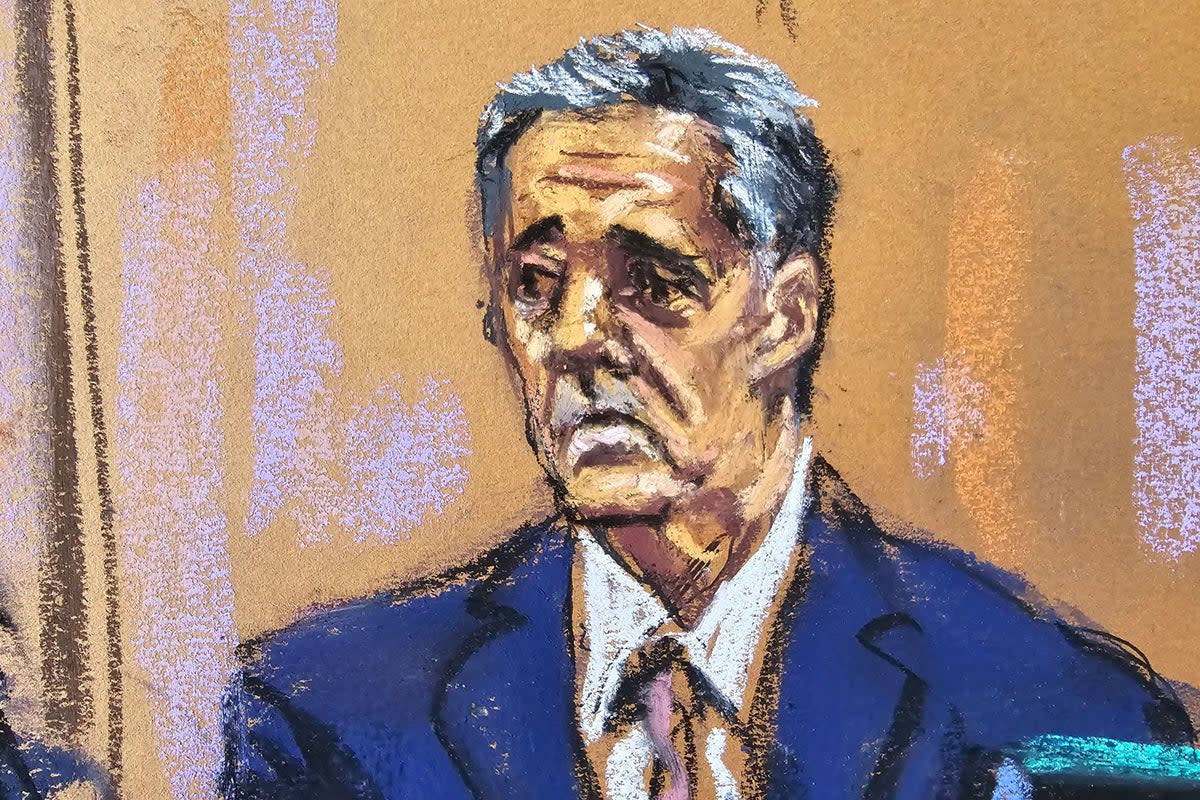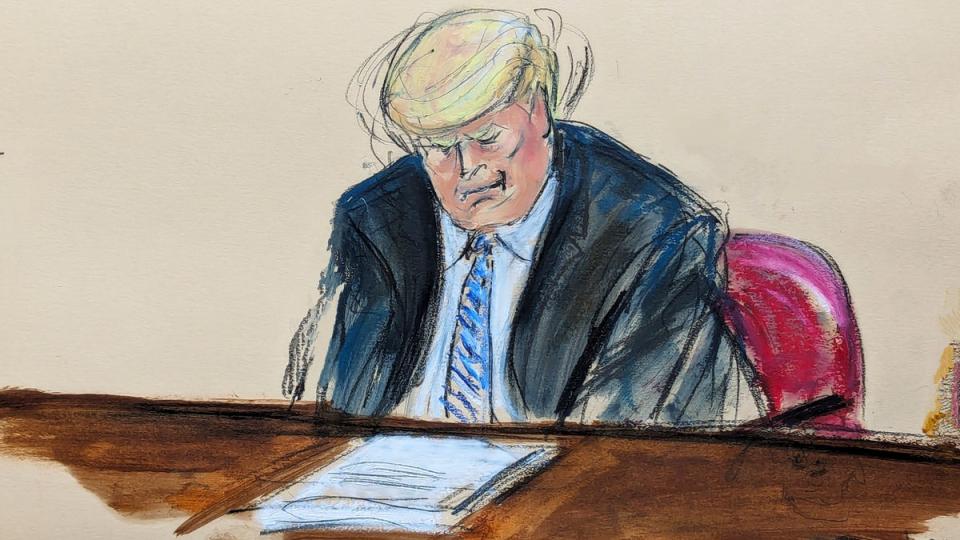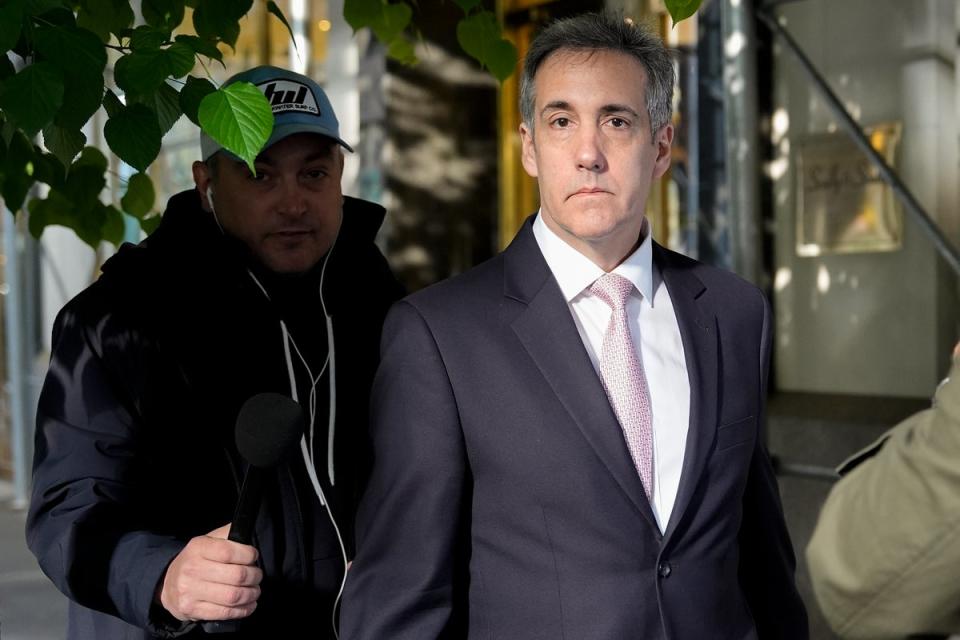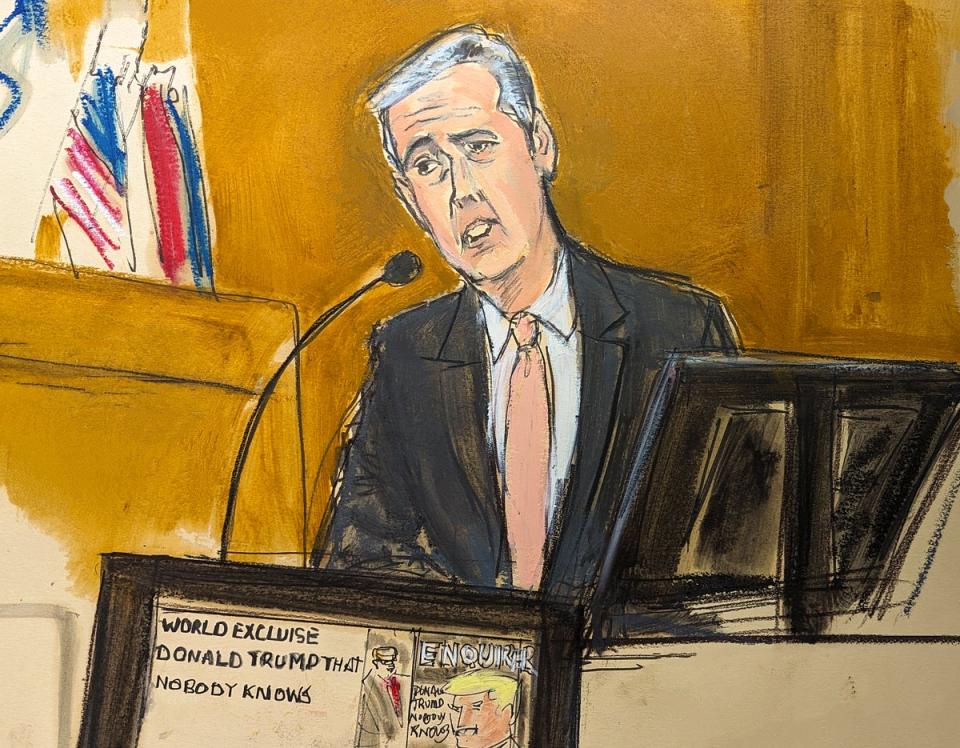Loyalist. Bully. Liar: The many faces of Michael Cohen

It’s the moment that everyone following Donald Trump’s hush money trial had been waiting for.
On Monday morning, the case’s star witness Michael Cohen took the stand to testify against his former boss and kick off the fifth week of the first criminal trial of a former president in American history.
Even before he stepped up to the witness stand, Cohen – as one of the most talked about figures of the ongoing criminal case – has been on display in many forms, both in trial and online.
In the first four weeks of the trial, Cohen’s name cropped up almost daily in courtroom testimony.
Jurors heard him described as Mr Trump’s “fixer,” his former personal lawyer, a campaign “surrogate,” a convicted felon, a “pants-on-fire kind of guy” and a liar.
Now, as he took the stand on Monday, Cohen revealed yet another version of himself: a compliant witness.
Cohen serves as the lynchpin of the payments at the heart of the criminal case against the former president.
It was him who gave adult film star Stormy Daniels $130,000 in payments ahead of the 2016 presidential election in exchange for her agreement to stay silent about an alleged affair she had with Mr Trump in 2006. Mr Trump is now on trial charged with 34 counts of falsifying business records related to those so-called hush money payments. He has pleaded not guilty.
‘Fixer’ and loyalist
On the stand, Cohen appeared agreeable and polite, often punctuating his responses to questions with a “ma’am” and referring to his ex-boss-turned-foe as “Mr Trump.” He spoke deliberately and slowly, keeping an even tone.
Composed, Cohen walked prosecutors through his communications with National Enquirer publisher and former American Media Inc (AMI) CEO David Pecker and Ms Daniels’ and Karen McDougal’s lawyer Keith Davidson, testifying that he set up a shell company to make the payments so as to “separate” Mr Trump from them.
Evidence shown in court has offered a glimpse into a day in the life of Cohen as Mr Trump’s attentive personal attorney.
His frequent invoices, texts, and emails ahead of the 2016 election have underscored Cohen’s loyalty to Mr Trump – and his urgency to kill stories that would have damaged his hopes of clinching the White House.
To showcase this loyalty, Cohen divulged that he often referred to Mr Trump as “boss”.

Cohen calmly slid on his glasses while reading through bombshell text messages that documented the catch-and-kill scheme. But, despite his laid-back read-through of the messages while on the stand, the tone and contents of Cohen’s messages were often urgent.
Take one day in July 2016, when Cohen appeared to be desperately trying to reach Mr Trump. The “fixer” had just heard from AMI employee Dylan Howard about the deal to quash the story about Mr Trump’s alleged affair with former Playboy model Karen McDougal.
Cohen texted Mr Trump’s bodyguard Keith Schiller. “Can we speak? I need you,” he asked.
After receiving no response for two minutes, Cohen quickly texted Schiller again: “You there?”
Documents shown in court also revealed a common thread in Cohen-created contracts in the catch-and-kill scheme: a $1m fee per violation. This breach provision was included in an agreement made to quash a story from Mr Trump’s doorman that he had fathered a “love child” with a woman who worked for him.
Cohen explained to the court: “I reviewed [the agreement] to make sure that Mr Trump was fully protected and to show that it had been taken care of.”
His testimony reflected this loyalty and revealed the extent to which he made himself available to Mr Trump’s demands.
He repeatedly testified that he would “immediately” provide updates to Mr Trump about the agreements, and would try to inform him in person in his office at the Trump Organization. He testified that Mr Trump had an “open door policy,” so he didn’t need an appointment.
On other occasions, outside of the office, Cohen said he would reach out to various contacts, like Trump’s “personal attache” Mr Schiller, to try to get in touch with his boss over the phone. Cohen said he would want to keep Mr Trump up to speed in order to show he had “accomplished a task.”

Be it creating a shell company or communicating with media figures or signing an agreement — that contained only pseudonyms — Cohen was there to protect Mr Trump.
Cohen even told the court that he initially offered to “front” the $130,000 to Stormy Daniels hismelf, explaining he was “doing everything” to “protect my boss, which is something I had done for a long time.”
This protection also extended to Mr Trump’s campaign – something that Cohen described himself as a “surrogate” to. Not only did he “frequently provide comment to press,” but Cohen also testified that he had even suggested making Trump’s 2016 campaign more diverse. “If we’re going to win, we need diversity,” he said.
He then “started” the group the National Diversity Coalition for Trump.
‘Pants-on-fire kind of guy’
But his demeanor on the stand – and the version that he presented of himself as a loyal problem-solver to his “boss” – came in sharp contrast to the Michael Cohen described by other trial witnesses to date, not to mention the Michael Cohen he himself presents online.
In the four-plus weeks of the trial so far, Cohen has been labelled as a “highly excitable, pants-on-fire kind of guy” and compared to the easily excitable cartoon dog from the Pixar movie Up who is distracted at the sight of a squirrel.
Another witness – Ms Daniels’ and Ms McDougal’s attorney Mr Davidson – said he feared Cohen “was going to kill himself” after he found out that he wasn’t being considered for a top position in the Trump administration when he took office.
Menwhile another said it would be fair to describe Cohen as an “aggressive guy.”
Undeniably, it’s this trait that comes across, at least in part, online.
Since working for Mr Trump, Cohen has had an eventful few years. He has gone to prison after pleading guilty to charges of lying to Congress, tax evasion, and campaign finance violations, and lost his ability to practice law in New York.
And, perhaps more publicly, the man once known as Mr Trump’s fixer has now become one of his most outspoken critics.

Last year, he testified against Mr Trump for the first time in his New York civil fraud trial. He has also launched podcasts where he often bashes his former boss.
But this criticism has come at a cost.
He has often emphasized that he doesn’t want to testify — but is forced to due to a subpoena. Part of the reason he doesn’t want to testify, he has said on his podcasts, is due to the frequent online attacks and threats he gets from “Trump-supporting haters”. On one of his podcasts, he wondered: “Why does my life need to be threatened…on a daily basis?”
Still, he has been undeterred with his charged posts toward Mr Trump.
He often posts tweets that goad the former president, even dubbing his former boss “VonS***zenpants” in the days after the trial began.
He trolled Mr Trump to such an extent that Judge Juan Merchan last week urged the prosecutors to tell Cohen to stop discussing the former president or the ongoing criminal case.
Meanwhile, the former president has been trying to amplify a decision made in March by a judge who rejected Cohen’s bid to end his supervised release early after the judge suggested that he had perjured himself over tax evasion claims.
Perhaps ironically, on Monday, the reformed former “fixer” admitted many times on the stand that he had not been truthful years ago in labeling certain forms dealing with the hush money payments. One wire transfer to Mr Davidson — intended for Ms Daniels — was marked as a “retainer,” according to documents shown in court.
Cohen admitted that description wasn’t accurate. The payment was actually made “in order to pay Stormy Daniels, executive the nondisclosure agreement” and “obtain her life rights.”
Now, Cohen will return to the stand to deliver more testimony on Tuesday – and jurors may see yet another side of the man at the heart of the case.


